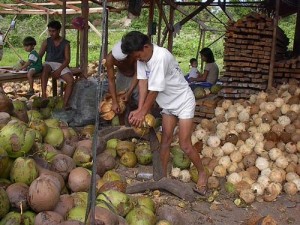 With copra prices plummeting, a former senator has urged government to help coconut farmers diversify and build viable cooperatives.
With copra prices plummeting, a former senator has urged government to help coconut farmers diversify and build viable cooperatives.
“Diversification is key to the economic survival of small growers facing severe hardship, with the farm-gate price of copra now down to as low as P15 per kilo from P40 a year ago,” said former Sen. Juan Miguel “Migz” Zubiri.
Zubiri urged the state-run Philippine Coconut Authority (PCA) to help planters expand their sources of farm income via intercropping.
“Short-season and high-value crops in between coconut trees will surely help,” Zubiri said, adding that corn, peanut, banana, cacao, coffee or pineapple may be cultivated in coconut farms.
The PCA should also encourage farmers to put up cooperatives to help them sell copra wholesale at superior prices, the former senator from Mindanao said.
“Cooperatives can eliminate traders who take advantage of cash-strapped farmers,” he said.
With some 3.5 million families dependent on coconut farming for their livelihood, Zubiri earlier warned that the copra price crash could aggravate hunger in the months ahead.
“We have to help coconut farmers become self-reliant and highly competitive entrepreneurs. Otherwise, they will forever be at the mercy of middlemen and volatile prices in the global markets,” he said.
A University of the Philippines-educated agriculturist, Zubiri’s legislative credits include the Cooperative Code, Organic Farming Act and the Agri-Agra Reform Credit Act.
The Philippines is the world’s largest producer of copra, the kernel from which coconut oil (CNO) is extracted for use in food, detergents and biofuels.
CNO exports have nose-dived by 41.5 percent due to the general economic slowdown in the US and Europe. The country shipped out only 209,256 metric tons (MTs) of CNO from January to April versus 357,622 MTs over the same period in 2011.

